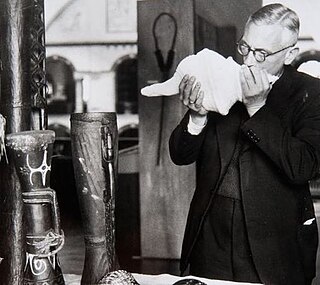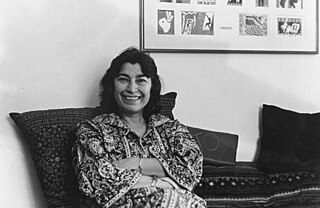Related Research Articles
Musicology is the scholarly analysis and research-based study of music. Musicology departments traditionally belong to the humanities, although some music research is scientific in focus. Some geographers and anthropologists have an interest in musicology, so the social sciences also have an academic interest. A scholar who participates in musical research is a musicologist.

Ethnomusicology is the multidisciplinary study of music in its cultural context, investigating social, cognitive, biological, comparative, and other dimensions involved other than sound. Ethnomusicologists study music as a reflection of culture and investigate the act of musicking through various immersive, observational, and analytical approaches drawn from other disciplines such as anthropology to understand a culture’s music. This discipline emerged from comparative musicology, initially focusing on non-Western music, but later expanded to embrace the study of any and all different kinds of music of the world.

Ethnography is a branch of anthropology and the systematic study of individual cultures. Ethnography explores cultural phenomena from the point of view of the subject of the study. Ethnography is also a type of social research that involves examining the behavior of the participants in a given social situation and understanding the group members' own interpretation of such behavior.
Bruno Nettl was an ethnomusicologist who was central in defining ethnomusicology as a discipline. His research focused on folk and traditional music, specifically Native American music, the music of Iran and numerous topics surrounding ethnomusicology as a discipline.

Alan Parkhurst Merriam was an American ethnomusicologist known for his studies of music in Native America and Africa. In his book The Anthropology of Music (1964), he outlined and develops a theory and method for studying music from an anthropological perspective with anthropological methods. Although he taught at Northwestern University and University of Wisconsin, the majority of his academic career was spent at Indiana University where he was named a professor in 1962 and then chairman of the anthropology department from 1966 to 1969, which became a leading center of ethnomusicology research under his guidance. He was a co-founder of the Society for Ethnomusicology in 1952 and held the elected post of president of that society from 1963 to 1965. He edited the Newsletter of the Society for Ethnomusicology from 1952 to 1957, and he edited the journal Ethnomusicology from 1957 to 1958.

Field research, field studies, or fieldwork is the collection of raw data outside a laboratory, library, or workplace setting. The approaches and methods used in field research vary across disciplines. For example, biologists who conduct field research may simply observe animals interacting with their environments, whereas social scientists conducting field research may interview or observe people in their natural environments to learn their languages, folklore, and social structures.
Helena Wulff is professor of social anthropology at Stockholm University. Her research is in the anthropology of communication and aesthetics based on a wide range of studies of the social worlds of literary production, dance, and the visual arts.
Jeff Todd Titon is a professor emeritus of music at Brown University. He holds a B.A. (1965) from Amherst College, an M.A. and a Ph.D. from the University of Minnesota. He taught American literature, folklore and ethnomusicology in the departments of English and Music at Tufts University (1971-1986), where he co-founded the American Studies program and also the M.A. program in Ethnomusicology. He taught at Brown University (1986–2013) where he was director of the Ph.D. program in Ethnomusicology. He held visiting professorships at Amherst College, Carleton College, Berea College, East Tennessee State University and Indiana University's Folklore Institute. His published books include Early Downhome Blues: A Musical and Cultural Analysis, Powerhouse for God: Speech, Chant and Song in an Appalachian Baptist Church, and Toward a Sound Ecology: New and Selected Essays. He is co-editor of the Oxford Handbook of Applied Ethnomusicology and general editor of Worlds of Music: An Introduction to the Music of the World's Peoples. He was editor of Ethnomusicology, the journal of the Society for Ethnomusicology, from 1990-1995. In 1998, he was elected a Fellow of the American Folklore Society, and in 2020, he received their Lifetime Scholarly Achievement Award.

Gerard Henri Béhague was an eminent Franco-American ethnomusicologist and professor of Latin American music. His specialty was the music of Brazil and the Andean countries and the influence of West Africa on the music of the Caribbean and South America, especially candomblé music. His lifelong work earned him recognition as the leading scholar of Latin American ethnomusicology.
Eduard Yefimovich Alekseyev was an ethnomusicologist who had conducted extensive field research on traditional music in Siberia and other regions of the former Soviet Union. His research focuses on theoretical problems of mode and melodic intonation, timbre, and notations as well as on sociological and psychological aspects of musical perception. He has served as a chairman of the Folklore Commission of the Union of Soviet Composers from 1972 to 1992. He has also served as a director of the department of the General Theory of Folklore at the Moscow State Institute of Art Studies.

Philip Vilas Bohlman is an American ethnomusicologist.

The cultrun is a percussion instrument used by the Mapuche in Chile.
Judith O. Becker is an American academic and educator. She is a scholar of the musical and religious cultures of South and Southeast Asia, the Islamic world and the Americas. Her work combines linguistic, musical, anthropological, and empirical perspectives. As an ethnomusicologist and Southeast Asianist, she is noted for her study of musics in South and Southeast Asia, including Javanese gamelan, Burmese harp, music and trance, music and emotion, neuroscience, and a theoretical rapprochement of empirical and qualitative methods. Becker teaches at the University of Michigan. In 2000, Becker was named the Glenn McGeoch Collegiate Professor of Musicology at the University of Michigan, and she was named professor emerita of music in 2008. From 1993 to 1997, she was a Senior Fellow of the Michigan Society of Fellows.
Stephen Blum is an American scholar and musician, whose research has primarily been in ethnomusicology. He has lent a multidisciplinary approach to the writing and publication of numerous articles discussing a wide range of musical topics and ideas.

Women in musicology describes the role of women professors, scholars and researchers in postsecondary education musicology departments at postsecondary education institutions, including universities, colleges and music conservatories. Traditionally, the vast majority of major musicologists and music historians have been men. Nevertheless, some women musicologists have reached the top ranks of the profession. Carolyn Abbate is an American musicologist who did her PhD at Princeton University. She has been described by the Harvard Gazette as "one of the world's most accomplished and admired music historians".

Antonius "Tony" Cornelis Gerardus Maria Robben is a Dutch cultural anthropologist and Professor Emeritus of Anthropology at Utrecht University, in the Netherlands.
Medical ethnomusicology is a subfield of ethnomusicology, which according to UCLA professor Timothy Rice is "the study of how and why humans are musical." Medical ethnomusicology, similar to medical anthropology, uses music-making, musical sound, and noise to study human health, wellness, healing and disease prevention including, but not limited to, music as violence.
Ethnomusicology is the study of music from the cultural and social aspects of the people who make it. It encompasses distinct theoretical and methodical approaches that emphasize cultural, social, material, cognitive, biological, and other dimensions or contexts of musical behavior, in addition to the sound component. While the traditional subject of musicology has been the history and literature of Western art music, ethnomusicology was developed as the study of all music as a human social and cultural phenomenon. Oskar Kolberg is regarded as one of the earliest European ethnomusicologists as he first began collecting Polish folk songs in 1839. Comparative musicology, the primary precursor to ethnomusicology, emerged in the late 19th century and early 20th century. The International Musical Society in Berlin in 1899 acted as one of the first centers for ethnomusicology. Comparative musicology and early ethnomusicology tended to focus on non-Western music, but in more recent years, the field has expanded to embrace the study of Western music from an ethnographic standpoint.
Aimee Meredith Cox is an American cultural anthropologist, former dancer, and choreographer.

Marcia Alice Herndon was an American ethnomusicologist and anthropologist. She specialized in the ways culture and music reflect each other. Herndon grew up in a family of country music performers in North Carolina. After completing her master's degree in 1964 at Tulane University, she performed classical music for several years. Earning a PhD in anthropology and ethnomusicology in 1971, she taught at the University of Texas at Austin, the University of California, Berkeley, and the University of Maryland. She is widely known for her contributions to Native American music studies with books such as Native American Music, as well as collaborating on Music as Culture, and Music, Gender, and Culture, which analyze the overlapping of musical forms and cultural structures.
References
- ↑ Music, Talent, and Performance: A Conservatory Cultural System, Temple University Press, 1988
- ↑ Rice, Timothy, review of Music, Talent, and Performance,American Anthropologist vo. 21/4 (1994)
- ↑ Herzfeld, Michael, Anthropology: Theoretical Practice in Culture and Society, Blackwell Publishing, 2001, p. 287
- ↑ Nettl, Bruno, Heartland Excursions: Ethnomusicological Reflections on Schools of Music, Univ. of Illinois Press, 1995, pp. 1-2, 147-8
- ↑ Loeb, Lawrence D., review of Music, Talent, and Performance,american ethnologist vol. 90/4 (1988)
- ↑ Koskoff, Ellen, review of Music, Talent, and Performance,Ethnomusicology vol. 34 (spring 1990) pp. 311-14
- ↑ “New Testament Anthropology and the Claim of an Ethnographer’s Voice,” ‘‘Dialectical Anthropology’’ 22: 79-93, 1997 [p. 80]
- ↑ ‘‘Music, Talent, and Performance: A Conservatory Cultural System’’ Temple University Press, 1988. pp. iv, xi
- 1 2 ‘‘The Truth of Music: Empire, Law, and Secrecy,’’ Full Court Press, 2005, Archived 2011-07-23 at the Wayback Machine pp. 24, 107, 113
- ↑ "The Secret Trial of Brown University: April 25 – May 5, 2004". Archived from the original on July 23, 2011. Retrieved September 9, 2010.